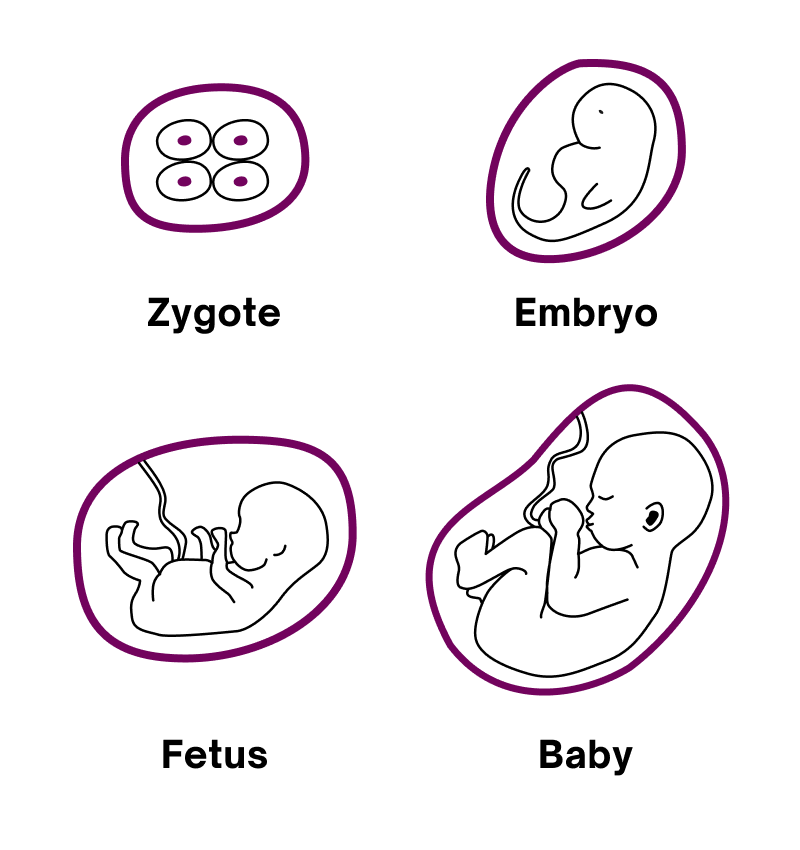Embryo vs fetus: What's the difference?
Key Takeaways:
- At eight weeks of pregnancy, the embryo becomes a fetus and remains a fetus until birth
- When a baby-to-be becomes a baby can be a sensitive topic, but the scientific terms we use are important for understanding your body and the phases of pregnancy
- How you refer to your unborn child is your choice
On this page
- What is an embryo?
- What is a fetus?
- When does pregnancy start?
- What to expect at your first prenatal visit
- How long does pregnancy last?
- Stages of fetal development
- Embryo vs. fetus week by week
- Overdue pregnancy
- Why the words we use are important
- We’re here to support your fertility journey every step of the way
What is an embryo?
An embryo is a tiny mass of cells that begins to develop about four days after fertilization. The embryonic stage starts around week three of pregnancy (when counting from the first day of your last period) and lasts until about week eight of pregnancy. Before you may even be aware that you’re pregnant, the embryo starts to take shape.
What is a fetus?
At around the ninth week of pregnancy, the embryo will become a fetus. The fetal stage starts nine weeks from your last period and lasts until birth, at which time the fetus becomes a baby. The fetus does most of its growing and maturing during the fetal stage. However, a fetus is not able to survive outside of the womb until week 22 or later. And even then, born this prematurely, a baby would need medical assistance and intensive care.
When does pregnancy start?
Pregnancy weeks start on the first day of your last menstrual period (LMP) and are about two weeks ahead of when conception actually occurs. This is considered the gestational age of the fetus and is referred to as pregnancy weeks.
It’s worth noting the clinical method of determining gestational age is based on a 28-day cycle that assumes that your ovulation is the 14th day of your cycle. If you're using the Natural Cycles app, we can reliably pinpoint your last ovulation day and precisely predict the exact date of fertilization (i.e., your actual day of conception). When you switch to the NC° Follow Pregnancy mode, we automatically adjust your conception date to align with the clinical method of counting weeks, giving you roughly the same pregnancy week as your medical practitioner.
Once you’ve found out that you’re pregnant, it’s important to book an appointment with your healthcare professional. Most first-time prenatal visits are scheduled in the second month of pregnancy, around week eight. Here are a few things you can expect at your first pregnancy checkup.
What to expect at your first prenatal visit
While it may differ depending on where you live, usually, your first prenatal appointment will include a physical and pelvic exam, blood and urine tests, and maybe even an ultrasound.
Your practitioner will most likely ask about your family history and other medical-related questions. It’s also a good chance to talk to your clinician about any worries you may have about the pregnancy.
How long does pregnancy last?
When we think about how long the average pregnancy is, we traditionally say it's nine months. However, a fetus is considered full-term at 40 weeks — and most babies will arrive between weeks 37-42 of pregnancy, which is technically a little longer than nine months.
Pregnancy is calculated as 40 weeks and divided into three trimesters. A lot of growth and maturing happens before a baby is ready for the outside world. Let’s explore the embryo and fetal developmental stages to understand what’s taking place in the womb.
Stages of fetal development
There are four stages of fetal development, from zygote to embryo to fetus to baby — and it all starts with fertilization.
The first l stage of prenatal development is the shortest stage, lasting about one week from the start of conception. Fertilization happens when the sperm and egg cell meet in the fallopian tube, combining their DNA to form a zygote. From here, the zygote will begin its journey to the uterus.
In the first 24 hours of fertilization, the zygote will divide multiple times — and in about five days, the zygote morphs into a structure which is called a blastocyst. The blastocyst consists of two parts: one part will become the embryo (and later the fetus), while the other part will become the placenta.
Now that we know a zygote is formed during fertilization, let’s learn more about when an embryo becomes a fetus.
Embryo vs. fetus week by week
Many refer to our developing offspring as a baby while in the womb. But for those 40 weeks before birth, a complex process occurs that turns an embryo into a fetus and a fetus into a baby.
In the first 2 weeks, you're not actually pregnant — your body is preparing for ovulation. Here is what happens in the weeks that follow.
Embryonic development (weeks 3 through 8)
- Week 3: Fertilization occurs, and the zygote is formed. The zygote then begins to divide as it makes its way to the uterus.
- Week 4:. This ball of multiple cells becomes the blastocyst. Around this time (eight to nine days after ovulation), the blastocyst attaches to the uterine wall in a process called implantation.
- Week 5: At this time, some of the important systems of the body are forming, like the nervous system and the circulatory system, which will become the heart.
- Week 6: Recognizable characteristics are starting to become noticeable as structures like the eyes, ears, and mouth start to take shape. Tiny buds that will become the arms and legs also begin to develop. The heartbeat can usually be detected.
- Week 7: The little limbs are starting to form cartilage while the arm buds are getting longer, soon forming hands.
- Week 8: The major organs and body systems have developed. During this week, the umbilical cord has fully formed. Legs are sprouting, along with tiny hands and feet. The embryo officially enters the fetal development stage at the end of the 8th week after fertilization (or 10 weeks of pregnancy), where it will remain a fetus until birth.
Fetal development (weeks 9 until birth)
The fetus will do most of its growth during this stage, preparing the baby-to-be for life outside of the womb.
- Weeks 9-12: The fetus is growing quickly. It is already starting to open and close its fists and mouth. It’s practicing drinking and urinating the amniotic fluid.
- Weeks 13-16: The fetus’ movements become more intentional. Fine hair starts to grow, its skin starts to thicken, and it’s forming fingerprints.
- Weeks 17-20: At this time, the fetus is covered in fuzz-like hair called lanugo and a fatty coating called vernix that helps protect it from the amniotic fluid. It is also starting to put on fat and getting stronger – you may even feel it when it kicks or has the hiccups.
- Weeks 21-25: It’s learning to grasp, and its movements are coordinated and more frequent. The lungs are now fully developed, and the fetus has bone marrow to help build blood cells.
- Weeks 26-30: It’s plumping up and gaining more body fat. The nervous system is nearly fully developed. The fetus has eyelashes and can blink.
- Weeks 31-35: Thanks to its melatonin, it no longer has translucent skin. While the lungs and brain continue to mature, many other major organs are well-formed and ready for birth.
- Weeks 36-40: By this time, the lanugo hair is gone and maybe positioning itself lower in the womb to prepare for delivery. At 39 weeks, the fetus is full-term. It will spend the last few weeks packing on its final weight, gaining about 0.5 pounds per week. At birth, the fetus officially becomes a baby.
Overdue pregnancy
It’s relatively common for a pregnancy to extend past the due date. In fact, only 4% of babies arrive on their estimated delivery date. While the risk for complications remains low the first week after the due date, certain health-related risks can increase as the days go by, with a greater risk of waiting two weeks beyond term.
A pregnancy that goes beyond 42 weeks is considered post-term. If a post-term pregnancy goes over by two weeks, usually, your healthcare professional will induce labor to help get the contractions started.
Why the words we use are important
Embryo, fetus, and baby — we’ve gone through the developmental stages and explained how each differs. But why does it matter what words we use?
At Natural Cycles, we acknowledge the weight that our words carry when relating to reproductive health. The words we use are important. It’s imperative that medical terminology is understood as evidence and science. Not only will the right terminology help you understand what is happening in your pregnancy, but it will also help you communicate effectively with your doctor.
Pregnancy can be a chance to nurture and bond with your developing baby. While every pregnancy is different, it’s important to use words that feel comfortable for you.
From zygote to birth — you can track the progress of your pregnancy week by week with NC° Follow Pregnancy.
We’re here to support your fertility journey every step of the way
Natural Cycles gives you personalized insights and knowledgeable advice with each mode. If you’re planning a pregnancy, why not give the NC° Plan Pregnancy mode a try? The NC° app is an FDA Cleared medical device that has helped millions of users plan for pregnancy naturally. Discover if Natural Cycles is right for you!
Did you enjoy reading this article?

